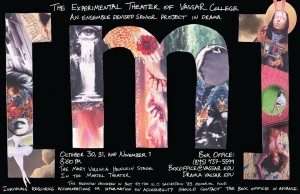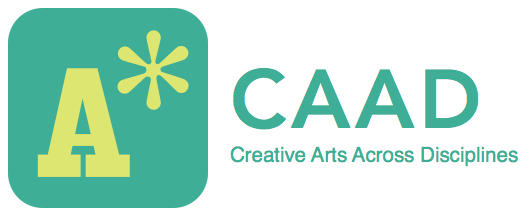 From the start, the roles are shifted. The audience sits on stools, chairs, and benches of all kinds on the Mary Virginia Heinlein Stage. A massive cloth hangs down from the ceiling, the curtain opens, and among the rows of seats of the Martel Theater, is the Virgin Mary. But this, as the rest of the pieces of the show, can mean anything. [m] is a collage, it’s a production that gives a voice and a place to the misrepresentation of women across history to explore a deeper, redemptional narrative. Each seat, a vantage point. The space, absolute. In one of the scenes the characters look out into a landscape of suspended dresses. In another, a family sits down to dine – on their daughter.
From the start, the roles are shifted. The audience sits on stools, chairs, and benches of all kinds on the Mary Virginia Heinlein Stage. A massive cloth hangs down from the ceiling, the curtain opens, and among the rows of seats of the Martel Theater, is the Virgin Mary. But this, as the rest of the pieces of the show, can mean anything. [m] is a collage, it’s a production that gives a voice and a place to the misrepresentation of women across history to explore a deeper, redemptional narrative. Each seat, a vantage point. The space, absolute. In one of the scenes the characters look out into a landscape of suspended dresses. In another, a family sits down to dine – on their daughter.
The students who crafted this performance for their senior projects, Andrea Negrete, Kelly Schuster, Madie Oldfield, Meropi Papastergiou, Taylor Dalton and Thomas Lawler, express their desire to deliberately construct a panorama in which the reception shifts from person to person. By utilizing space in new and meaningful ways, each individual (audience or actress) is exposed to distinct messages.
During one of the preview performances, the seniors behind and before this production form a panel to address the Drama department students’ inquiries, which proves to be extremely elucidating. A member of the audience asks whether the texts are intended to be recognized, and if so, to what purpose. The panel says the allusions and material of [m] will undeniably make a unique impression on each of the viewers; mainly because everyone’s experience informs their meaning, “If you know where it’s from, great! If not, great!”
As a devised ensemble senior project, [m] incorporates feminist and queer voices through a collage of sources to “dislike, dislocate, disembody, deconstruct, derail, derange, and deform” man-made archetypes of women. When prompted about the significance of the title, the seniors explain that the letter encompasses a wide range of iconic female characters whose names begin with M: the Virgin Mary, Marilyn Monroe, Malice, Medusa, Marie Antoinette; and get this, m downwards becomes w for woman. The brackets could be a symbol for the confinements from which this play strives to break free: [m] is not about victimization, it’s about the liberation following the profoundly explored discourses of women, dispelling the stereotypes that have narrowed the depth of the characters through time.
The final portion of the program reads, “We are making art because it matters. This is not a world in which we wish to live. – Love, [m]“
Stage Manager: Collin Knopp-Schwyn, Lighting Technical Director: Joey More, Costume Coordinator: Taylor Bowen. This production is sponsored in part by the E.J. Safirstein ’83 Memorial Fund.
